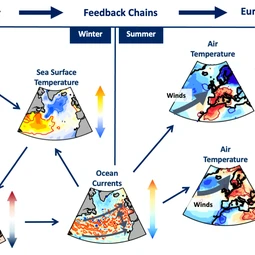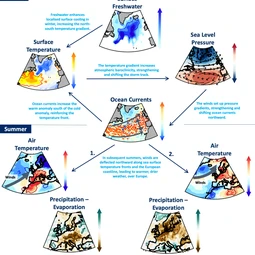Meltwater in the North Atlantic can lead to European summer heatwaves, study finds
23 February 2024
MUNICH: Scientists from the National Oceanography Centre (NOC) have discovered that increased meltwater in the North Atlantic can trigger a chain of events leading to hotter and drier European summers.
The paper, published in the European Geosciences Union’s open access journal Weather and Climate Dynamics, suggests that European summer weather is predictable months to years in advance, due to higher levels of freshwater in the North Atlantic.
Discussing the implications, lead author Marilena Oltmanns, Research Scientist at the National Oceanography Centre, said: “While the UK and northern Europe experienced unusually cool and wet weather in Summer 2023, Greenland experienced an unusually warm summer, leading to increased freshwater input into the North Atlantic. Based on the identified chain of events, we expect that the ocean-atmosphere conditions will be favourable for an unusually warm and dry summer over southern Europe this year.”
Marilena continued: “Depending on the pathway of the freshwater in the North Atlantic, we are also expecting a warm and dry summer in northern Europe within the next 5 years. We will be able to estimate the exact year of the warm and dry summer in northern Europe more closely in the winter before it occurs.”
Melting sea ice and glacial ice are a growing source of freshwater to the North Atlantic, and changes in the amount of sea ice can disrupt normal ocean circulation, influencing global climate. With increases in ice melt, the study suggests that European heatwaves and droughts will become more intense in future. The warming over Europe after strong freshwater releases in the North Atlantic will add to the warming already happening because of climate change, by causing weather patterns to shift.
In conclusion, Marilena says, “Our findings demonstrate the importance of ocean observations, to ensure climate models capture all physical processes required to make accurate weather predictions. This study is a step forward for improving models, which will enable industries and stakeholders to plan ahead for specific weather conditions, such as adapting agricultural methods to be more resilient, predicting fuel usage, and bracing for flooding events.”
More information
The European Geosciences Union (EGU) is Europe’s premier geosciences union, dedicated to the pursuit of excellence in the Earth, planetary, and space sciences for the benefit of humanity, worldwide. It is a non-profit interdisciplinary learned association of scientists founded in 2002 with headquarters in Munich, Germany. The EGU publishes a number of diverse scientific journals, which use an innovative open access format, and organises a number of topical meetings, and education and outreach activities. Its annual General Assembly is the largest and most prominent European geosciences event, attracting over 15,000 scientists from all over the world. The meeting’s sessions cover a wide range of topics, including volcanology, planetary exploration, the Earth’s internal structure and atmosphere, climate, energy, and resources.
If you wish to receive our press releases via email, please use the Press Release Subscription Form at https://www.egu.eu/news/subscription/. Subscribed journalists and other members of the media receive EGU press releases under embargo (if applicable) 24 hours in advance of public dissemination.
Contact
For press enquiries: noc@grayling.com
If unreachable, please contact:
Gillian D’Souza
Media Relations Manager
European Geosciences Union
E: media@egu.eu
Links
- Published study
- EGU journal Weather and Climate Dynamics


